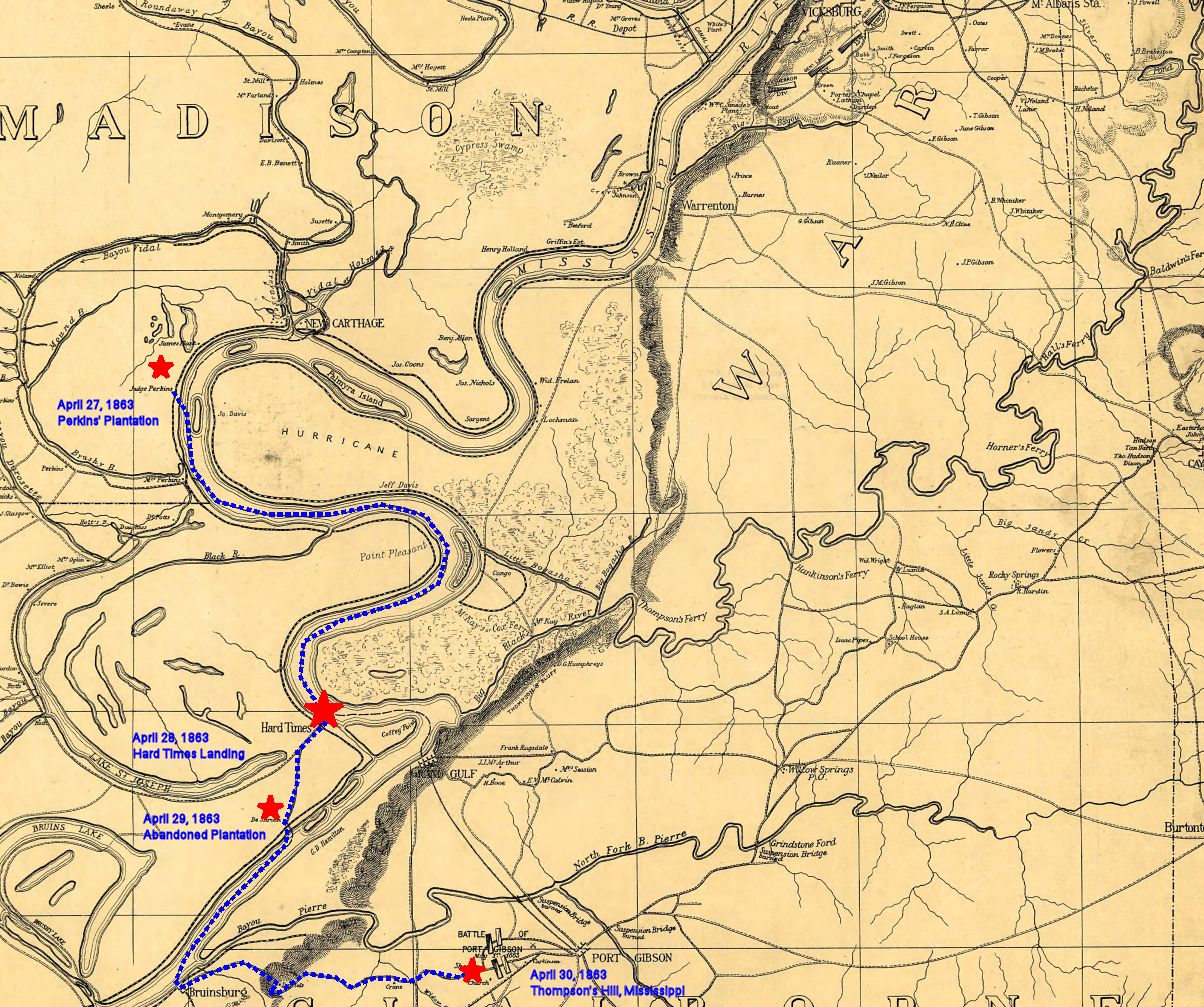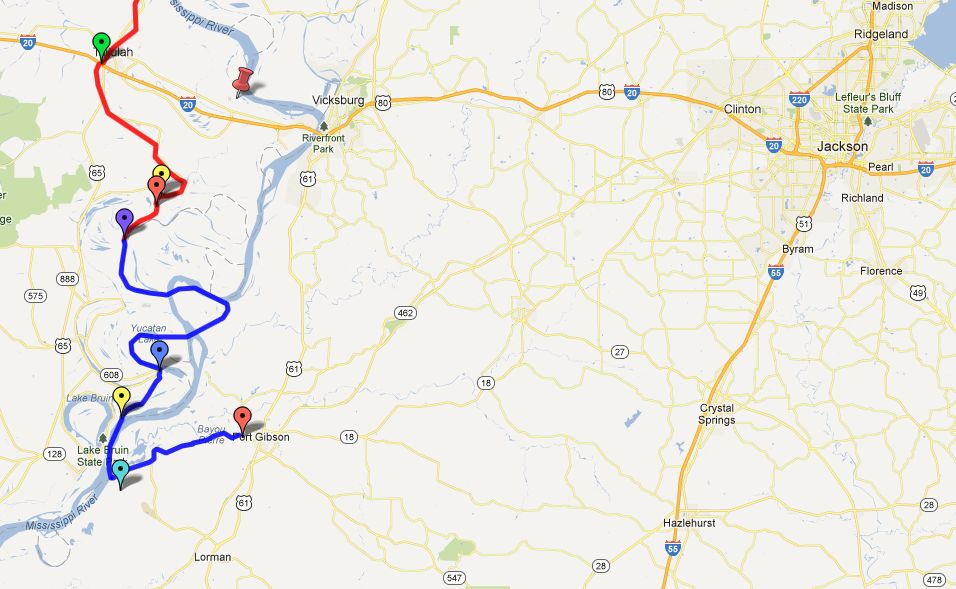| Previous Date | Day By Day Index | 16th OVI Home Page | Next Date |
Where was the regiment on
Thursday, April 30, 1863
On this day the 16th Ohio, with Grants' large attack force, left their campsite on the Mississippi River below Hard Times Landing, Louisiana, taking steamboats south, below the still dangerous Rebel fortifications at Grand Gulf, and landed on the Mississippi side of the river at Bruinsburg Landing. The troops drew five days of rations and began marching toward Port Gibson, about 12 miles due east.
The Union force was about to encounter the Confederate defenders at the Battle of Thompson's Hill or Port Gibson.
Cpl. Theodore Wolbach, in his post-war account of the 16th Ohio, writes of this day:
The next morning, the 30th, we embarked on every available craft--gunboat, transport and barge--and moved out into the river. The Price had the Silver Wave and Forest Queen lashed to her. Steaming up stream a half mile this trio; with Osterhause's [sic] division aboard, possibly made the rebels think that we were going to land under their guns in force. With field glasses we could see some lively stirring around in their works. When every boat was crowded to its full capacity with its living cargo, the fleet started rapidly down the river. A pleasant run of six miles brought us to a landing called Bruinsburg, Miss. ... Rations were hurriedly brought ashore and issued to the soldiers, or rather they were told to take what they wanted. Abundance was given to each regiment, and the boys took a liberal supply of hard-tack, sow-belly and coffee--the staff of life, for an active campaign. Gen. Carr's division soon took up the march for the interior followed in a short time by our division under Gen. P.J. Osterhaus.
Wolbach continues:
With nimble step and light hearts we moved out o the road that led from the river to the highlands of the State. Over the intervening forest we could see the tops of the hills and a few houses. Marching without halt through a strip of heavy timber, where to the right and left swamp oak and cypress.
We soon reached the foot of the bluffs where the road ascends by a steep grade. There was a gratifying sensation in the thought that we were soon to be out of the lowlands where the fortunes of war had kept us for four long disagreeable months. As we marched up higher and higher, and looked beyond the dark forest below, away beyond on the great river where the boats were active in bringing the men and material down that were to follow us, our glad hearts swelled wit that irresistible martial feeling that naturally finds vent in good healthy yells. We were now truly in a hostile country in close proximity to large armies of the foe, but they were of our race and we knew that we were their peers in battle. We ha an alternative to inhale the malaria of the Mississippi bottoms, or beard the lion in his den. We willingly, I might say joyfully, accepted the latter. Yet there were a few--though not with a lack of resolution--who dreaded coming into this State to fight. The preceding events had made the great magnitude of the work at hand apparent. Hitherto every effort to get in the rear of Vicksburg had been promptly and fiercely resisted. Jeff Davis had just made a gushing speech to Pemberton's soldiers, in which he declared that the stronghold of Vicksburg was second in importance to none in the Confederacy, and must be held at all hazards. Richmond and Vicksburg seemed to be the two vital points in the hands of the enemy. When they capitulated, we looked for the grand collapse. The former seemed as safe from Federal occupation as the city of London. The vulnerability of the latter was now to receive a severe test. Let us see with what result. Before entering fairly into this campaign, the regiment had been stripped of every sick, or convalescent man. Every unnecessary encumbrance had been left behind. Consequently there was little straggling. During all that delightful day the boys marched compact and well. Often passing between long rows of rose hedges that were now in bloom and filled the air with its balmy fragrance. At almost every plantation the appearance of hasty flight was evident. Everything in chaotic disorder, all the imaginable variety of household goods and fittings littered over the floors; doors standing open and white folks gone. The negroes, with few exceptions, remained. They were happy and jubilant; gladly answered every question that was asked, and volunteered to show us where provisions and other valuable stores were hidden in the woods and the canebrakes.
* Information and italicized quotations from a series of articles entitled Camp and Field - The Old 16th Ohio, written in the 1880s by Theodore Wolbach, late Corporal in Company E, 16th Ohio Volunteer Infantry.
Period map showing the route of Grant's army, including the 16th Ohio, Hard Times Landing, Louisiana, to Bruinsburg, Mississippi then marching to Port Gibson, Mississippi on April 30, 1863:

Modern day map of the 16th Ohio's march from Perkins' Plantation to Hard Times Landing, Louisiana:
Purple pin - Perkins' Plantation, from where the 16th Ohio and elements of Grant's force embarked on steamboats on April 28, 1863
Blue pin - Hard Times Landing, Louisiana, where the 16th Ohio, Osterhaus' 9th Division and other elements of Grants force disembarked from their boats on April 29, 1863.
Yellow pin - An abandoned plantation to where the troops marched and camped the night of April 29, 1863.
Aqua pin - Bruinsburg, Mississippi, where the 16th Ohio and all of Grant's force landed on April 30, 1863
Red pin - Approximate location of Thompson's Hill, about two or three miles west of Port Gibson, Mississippi, where the Battle of Thompson's Hill occurred on May 1, 1863.
Note: Route shown is approximated along Mississippi River bed as it was in 1863.

| Previous Date | Day By Day Index | 16th OVI Home Page | Next Date |